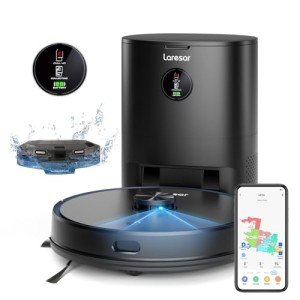The Rise of Robot Vacuum Cleaners: A Comprehensive Guide
Over the last few years, robotic innovation has actually penetrated different aspects of every day life, substantially modifying how jobs are accomplished. One of the most cutting-edge developments in this area is the development of robot vacuum. These devices have actually moved from a luxury product to a vital home tool, offering convenience and effectiveness to millions of users around the world. This article will explore the mechanics, benefits, restrictions, and popular designs of robot vacuum, along with address some often asked questions.
What is a Robot Vacuum Cleaner?
A robot vacuum is an autonomous gadget designed to clean floorings without human intervention. Geared up with sensing units, brushes, and vacuum innovation, these small devices can browse a home, effectively selecting up dirt, dust, and debris. Many modern models feature various features, including Wi-Fi ability, mobile phone applications, and home mapping innovation, which permit users to keep track of cleaning progress from another location.
How Robot Vacuum Cleaners Operate
Robot vacuums use a number of technologies to guarantee efficient cleaning. Below are the primary elements that add to their functionality:
- Navigation Sensors: Most robot vacuums include different sensors (infrared, ultrasonic, and so on) that assist identify barriers, stairs, and walls, allowing the gadget to navigate a room effectively.
- Suction Mechanism: The vacuum employs a suction system to gather dirt and dust from surfaces. Lots of models use innovative cyclonic technology to improve suction power.
- Cleaning Brushes: Different types of brushes (side brushes, rolling brushes) help in loosening dirt and assisting debris into the vacuum's suction location.
- Battery System: Operating on rechargeable batteries, robot vacuums can clean autonomously for an established period before going back to their docking station to recharge.
- Smart Features: Many designs are equipped with Wi-Fi connection, enabling users to control cleaning schedules, suction power, and zoning via smartphone apps. Some even support voice control through wise home gadgets like Amazon Alexa and Google Assistant.
Benefits of Robot Vacuum Cleaners
The combination of robot vacuum cleaners into daily cleaning jobs uses several substantial advantages:
- Time-Saving: They perform cleaning autonomously, enabling users to focus on other essential activities.
- Consistent Cleaning: Robot vacuums can clean up on a routine schedule, making sure that dirt and dust do not accumulate.
- Benefit: Most models can be run while users are out of your home, or perhaps from remote places through smartphone apps.
- Space Efficient: With their compact design, they can access areas that traditional vacuums can not, such as under furnishings and in tight areas.
- Smart Technology: The included functions, such as mapping and scheduling, offer users with enhanced control over their cleaning regimens.
Limitations of Robot Vacuum Cleaners
Regardless of their various advantages, robot vacuums do feature some limitations:
- Initial Cost: High-quality robot vacuums can be more pricey than traditional vacuums, which may prevent some consumers.
- Manual Assistance Needed: Robot vacuums may struggle with big debris or thick carpets, needing occasional manual vacuuming.
- Battery Life: Depending on the design and the size of the home, the battery life may limit just how much area can be cleaned in one session.
- Maintenance: Regular upkeep, such as emptying the dustbin and cleaning brushes, is vital to keep the vacuum operating successfully.
Popular Robot Vacuum Models
Here's a table comparing a few of the premier robot vacuum on the market:
| Model | Suction Power | Battery Life | Smart Features | Cost Range |
|---|---|---|---|---|
| iRobot Roomba 980 | High | As much as 120 min | Wi-Fi, App Control, Alexa | ₤ 600 - ₤ 800 |
| Roborock S7 | Really High | As much as 180 min | Mapping, Virtual Barriers, App | ₤ 400 - ₤ 600 |
| Ecovacs Deebot OZMO T8 | High | Up to 240 minutes | AI Smart Navigation, App Control | ₤ 600 - ₤ 700 |
| Neato Botvac D7 | High | As much as 120 min | Mapping, Zone Cleaning | ₤ 600 - ₤ 700 |
| Shark IQ Robot | Moderate | As much as 90 minutes | Self-Cleaning, App Control | ₤ 400 - ₤ 500 |
Frequently Asked Questions About Robot Vacuum Cleaners
Q1: Can robot vacuum replace conventional vacuums?
While robot vacuums can considerably decrease the need for traditional vacuuming, they are best utilized as a complementary tool rather of a complete replacement. For deep cleaning or larger particles, conventional designs might still be needed.
Q2: Are robot vacuums effective on all types of flooring?
The majority of robot vacuums carry out well on tough surface areas like tile and wood, in addition to low-pile carpets. Nevertheless, users with high-pile carpets might find restricted efficiency and should think about particular models created for those surfaces.
Q3: How do robot vacuums handle pet hair?
Many models are specifically created with effective suction and rubber brushes that effectively gather family pet hair from carpets and furniture. It's recommended to examine evaluations focusing on pet owners' experiences for better insights.
Q4: Do robot vacuums need much upkeep?
Robot vacuums do require some maintenance. Users should frequently clear the dustbin, clean the brushes and sensing units, and look for any blockages to keep optimum performance.
Robot vacuum cleaners have actually changed the cleaning landscape, providing users time-saving, efficient, and practical options to floor maintenance. While they might not totally replace conventional vacuums, their integration into homes signifies an advance in how we approach home cleanliness. As kourtneydurdan.top develops, we can expect even more developments in this space-- making robot vacuums an ever-relevant household tool.

